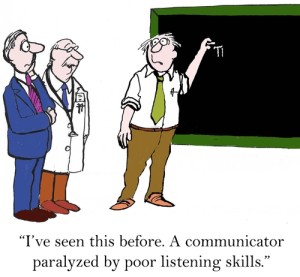I teach and coach interpersonal communication skills. I am amazed by the number of posts, articles, blogs that exist on how to improve listening skills. I’m not sure if technology is the problem—heads down, fixated on smartphones, earphones plugged into music devices—or if it goes back to shows like Sesame Street that so many of us grew up watching, with their short (attention) learning segments. Do we really have more distractions today than in the past? I’m sure my grandparents would have complained at some point about all the distractions in their lives. I can imagine someone 75 years ago complaining that folks didn’t talk to one another anymore because the wireless radio was on all the time J. But there does seem to be an overriding feeling that there is less understanding going on when we communicate with one another.
I hear all the time that people are not listening to one another. But is that really what’s going on? I don’t believe it is just “listening,” but more of “listening to understand.” Being present not only to what is being said, but also the tone and body language of the person speaking. To fully engage someone we need to be aware of their whole self, not just their words. At the same time we need to be aware of our own body language. Are we sending the non-verbal message that we are listening? Are we looking the other person in the eye, nodding when appropriate?
We listen or hear from our own perspective, the reality in which we live, our understanding of our own world. So ask questions to clarify the speaker’s meaning. Reframe what they have said in your own words, to see if you get agreement on their intent. By doing this you learn to seek their perspective and reality, rather than defaulting to your own.
We have to be aware of our own emotional stance. If we are having trouble understanding the message, or having trouble getting our message across, look for the common perspective. It may be difficult but we need to keep our composure. Try to understand that negative comments are not necessarily personal, but more likely born from frustration with the situation.
Intent is important – are we being clear about it? Understanding the difference between words and meaning is a vital capability for effective communications and relationships. For example, as John Ruskin stated: “The essence of lying is in deception, not in words.” (John Ruskin, 1819-1900, English art critic and social commentator). I learned long ago that when starting a difficult conversation with someone, it was critical to state my intent, and more importantly what it was not. I found that this allowed the other person to listen to what I was saying, and to understand the message behind the words.
You can’t make another person actively listen to you, but you can increase the odds in your favour by understanding the other person’s communications style. Does she only need quick, basic information with few details, or does she need a lot of detail, maybe even to make a list? Does he appreciate it when you are talking to him with an emotional message, or does he not want any emotional attachment to the message at all? By recognizing these four basic things you can change how you communicate with others, giving them what they need to understand and process what you are saying or asking.
